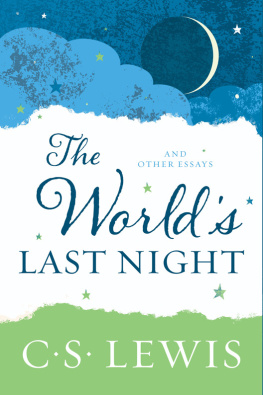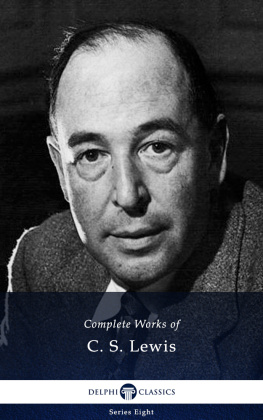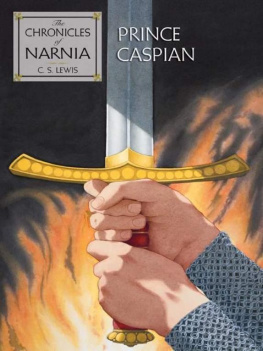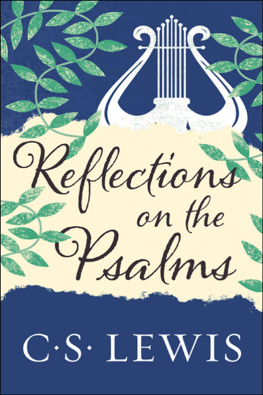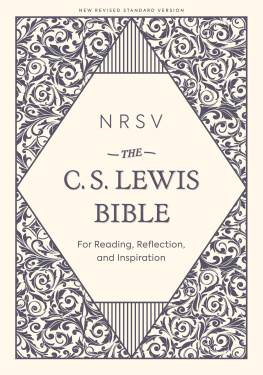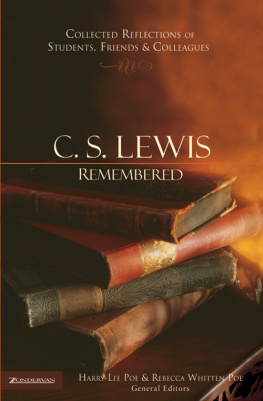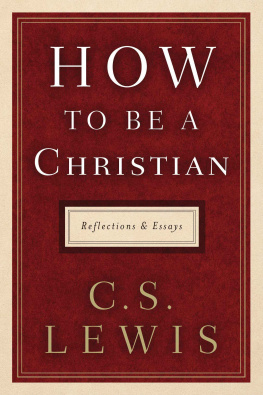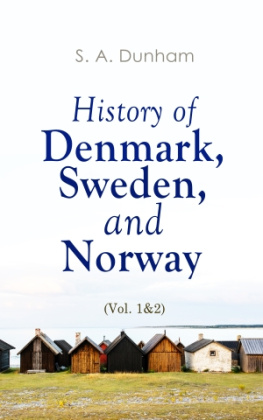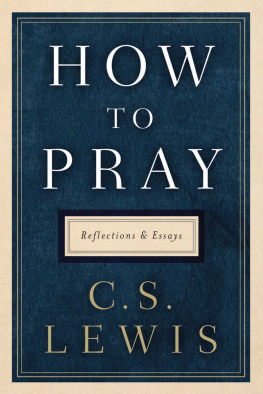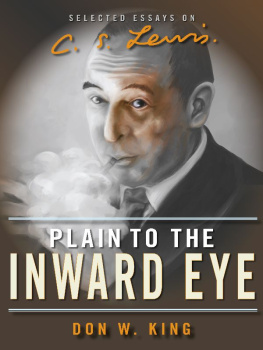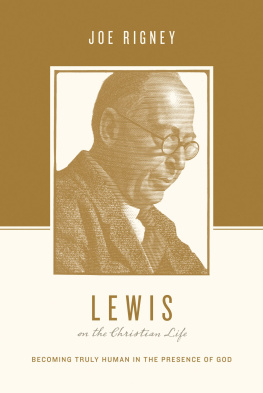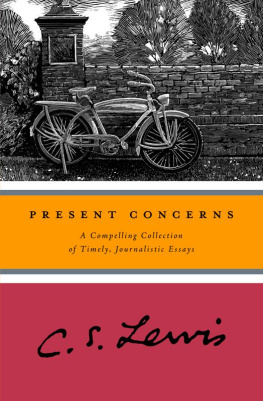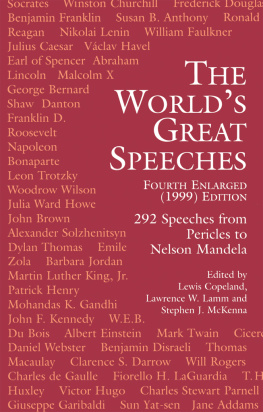C. S. Lewis
In his beautiful peroration at the end of his sermon The Weight of Glory, C. S. Lewis, after commenting on the immortality of the human soul, says, This does not mean that we are to be perpetually solemn. We must play. But our merriment must be of that kind (and it is, in fact, the merriest kind) which exists between people who have, from the outset, taken each other seriously.
I believe that this and similar encouragements by Lewis contribute significantly to the subject of what constitutes Christian behaviour. Having done the best we can to perform whatever God demands, should we not at least enjoy the good He sends us? Willing ourselves to be perpetually solemn when there is no reason for it seems to me not only a rejection of the happiness we could have on earth, but also to jeopardise our capacity to enjoy it in the future when every possible reason for unhappiness has been finally swept away.
We know from his earliest writings that Lewis was born with a sense of fun, and that it was considerably maimed by an entanglement of atheism and ambition. Perhaps a fiercely serious ambition for whatever it might be can never live in harmony with the merriment he describes. Certainly, Lewis could write no great works until he was converted to Christianity in 1931, after which he ceased to take much interest in himself. If it is objected by those of a lugubrious disposition that the Christian religion is serious and of great solemnity, then my answer is, Yes, of course. And not taken seriously enough. But Lewis comes to our rescue at this point by showing us in his book The Four Loves how easily things can become other than they should be through the wrong kind of seriousness.
In editing these essays I have been led to reflect on that ever mysterious, but instinctive notion we seem to be born with that tells us just how merry, how serious, how whatever you will, we know we can be with someone else. My relation to Lewis may be similar to that of others, but it cant be exactly like. As this book is being edited primarily for Americans, I should explain that after I had corresponded with Lewis for some years, he invited me to come over in the spring of 1963 from my native United States for what I hoped would be as much as a single conversation over a cup of tea. I dont believe in luck, but I do believe in angels, and the coveted tea party turned out to be (if it needs a name) The Observations of a Late Arrival or A Single Summer with C.S.L. In any event, as the sources of our firsthand evidence about him decrease with the years, I hope that mine will be of some interest to those who feel as I do about that merriment of the merriest kind of which there seems no abundance these days.
It took some time for an American, such as myself, to adapt to English conveniences. I see, for instance, from my diary of 7 June 1963 that during a longish visit with Lewis we drank what seemed gallons of tea. After a while I asked to be shown the bathroom, forgetting that in most homes the bathroom and the toilet are separate rooms. With a kind of mock formality, Lewis showed me to the bathroom, pointed to the tub, flung down a pile of towels, and closed the door behind me. I returned to his sitting-room to say that it was not a bath I wanted butWell, sir, choose you this day, said Lewis, bursting with laughter as he quoted the prophet Joshua, that will break you of those silly American euphemisms. And now, where is it you wanted to go?
I see from other entries I made that Lewisor Jack as he preferred to be called by his friendsand I were meeting at least three or four times a week, sometimes at his house, at other times in a pub with a group of friends called The Inklings. I knew that he was ill, indeed, that he had been so since 1961 when the troubles with his health began. He, however, seemed to think little of it and, as he looked so robust, it was easy to forget it when in company with this ruddy, six-foot, genial man. Hence the surprise of finding him not well enough to attend Mass with me on July 14. He urged me to remain there with him, and this was a memorable day for me in more ways than one. It was then that he asked me to accept immediately a post as his literary assistant and personal secretary, and later, after resigning my teaching position at the University of Kentucky, to return to Oxford to resume my duties.
Lewis went for a routine examination the next morning to the Acland Nursing Home, and, much to everyones surprise, he sank into a coma, lasting about twenty-four hours, from which the doctors did not believe he would recover. Our mutual friends, the Reverend Dr. Austin Farrer and his wife, were to be on holiday in Wales from the sixteenth through the thirty-first of July, but at Lewiss request they remained in Oxford until the seventeenth, so that Austin Farrer could hear his confession and give him the Blessed Sacrament. Lewis wanted me to receive the Sacrament with him, but as I was not ill, this was not allowed. In that case, Lewis said, you must be present to do the kneeling for me. With so much to do for him at this time I was unable to keep a regular diary. However, I see from a letter I wrote to the Farrers on July 30 from Lewiss home, and now part of the Farrer Papers in the Bodleian Library, Oxford, that I had already moved into Lewiss home by that time.
Rather than tell Lewis how close he had come to dying, the doctors appeared to leave this to me. When I judged the time to be right, I told him about the coma and the few days when his mind was disordered. Thereafter Lewis continued to believe that the Extreme Unction administered during the coma and his reception of the Blessed Sacrament had saved his life.
Even before he went into the nursing home I marvelled that Lewis had lived so long without setting himself ablaze. Except when he dressed for a special occasion, he wore an old tweed jacket, the right-hand pocket of which had been patched and re-patched many times. This was because Lewis, when wearied of his pipe, would drop it into his pocket, with the result that it would burn its way through. And this happened so often that there was none of the original material left.
The nurses in the Acland, having found him nodding with a cigarette in his hand, would have none of this. And so it was that, except when I was with him, they would not allow him to have any matches. What puzzled Lewis was that after I had left him with a box of matches, a nurse would, as soon as I left, rush in and take them away. How do they know? he asked me one morning. Give me a box I can hide under my bedclothes. I had then to confess that while I was the supplier, I was also the informer. Informer! roared Lewis. I have what no friend ever had before. I have a private traitor, my very own personal Benedict Arnold. Repent before it is too late!
I loved all the rough and tumble of this, and I fancy I pulled his leg about as often as he pulled mine. But there was the gentler side that was just as typical. There was one incident that took place in the Acland which the readers of his Narnian stories might find as endearing as I did. It occurred on one of those days when Lewiss mind was disordered and when, as I noticed, he could not recognise any of those who dropped in to see himnot even Professor Tolkien. The last visitor of the day was his foster-sister, Maureen Moore Blake, who a few months previously, and by a very unexpected turn of events, had become Lady Dunbar of Hempriggs, with a castle and a vast estate in Scotland. She was the first woman in three centuries to succeed to a baronetcy. They had not met since this happened and, hoping to spare her any disappointment, I told her that he had not been able to recognise any of his old friends. He opened his eyes when she took his hand. Jack, she whispered, it is Maureen. No, replied Lewis smiling, it is Lady Dunbar of Hempriggs. Oh, Jack, how could you remember that? she asked. On the contrary, he said. How could I forget a fairy tale?

